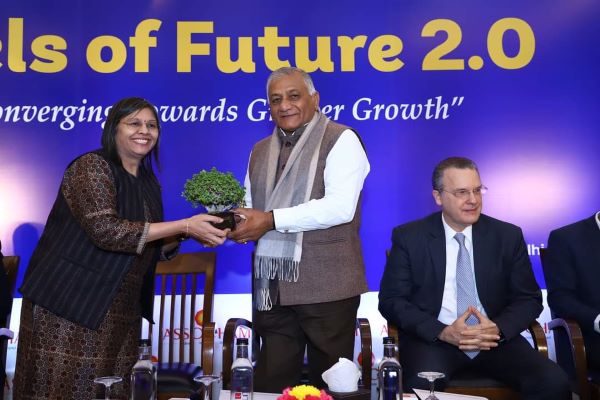Govt. is working towards a more liberal regime so that the production and sale of alternate fuels is made easier

Dr. Sangeeta Srivastava, Chairperson, ASSOCHAM Task Force on Alternative Fuels & Executive Director, Godavari Biorefineries Ltd. welcoming Gen (Dr.) V.K. Singh, (Retd.), Minister of State Ministry of Road Transport and Highways & Civil Aviation, Govt. of India at Fuels of Future 2.0 a conference organised by ASSOCHAM
Today there is greater awareness on the need for alternative fuels to replace fossil fuels. “With sustainability and environmental impact as primary concerns, the effect of cleaner alternative fuels will ensure that the air that we breathe is cleaner than what it is today. There are various alternative fuels available, and we are working towards a more liberal regime so that the production and sale of alternate fuels is made easier,” said Gen (Dr.) V.K. Singh, (Retd.), Minister of State Ministry of Road Transport and Highways & Civil Aviation, Govt. of India at Fuels of Future 2.0 a conference organised by ASSOCHAM.
“We have also made a big push towards electric mobility where li-ion has been at the forefront but there is a great amount of research on sodium-ion and finding alternatives to li-ion so that we can become more independent of the lithium cycle altogether. There is also a push on sustainable aviation fuel and we have conducted a trial of sustainable aviation fuels powered flight. The greatest challenge before us today is what alternative fuel we adopt and how we can bring about a change in mindset towards alternative fuels.” he added.
Aswani Srivastava, Joint Secretary (Sugar), Department of Food & Public Distribution, Govt. of India in his address said, “The Government has limited the diversion of sugar to ethanol produced from Sugarcane juice and B-Hy molasses in view of the estimated drop in the production of sugar in the country. We are committed to the target of 20 percent ethanol blending by 2025 for which around 1016 crore litres of ethanol for blending and 334 crore litres for other industrial use will be required. Considering plants run at 80% of their installed capacity about 1,700 crore litres capacity should be in place by 2025. Today our capacity stands at 890 crore litres through molasses and about 510 crore litres from grain based feedstock. Additional capacity of 300 crore litres needs to be added.”
Addressing the gathering at the conference, Kenneth Felix Haczynski da Nobrega, Ambassador, Embassy of the Federative Republic of Brazil spoke on the need for greater cooperation between the two countries on sustainable energy sources. “The launch of Global BioFuel Alliance during India’s G20 presidency is indeed a groundbreaking endeavour in clean energy. It heralds the beginning of a new phase, one that will consolidate biofuel technology as an important option for decarbonisation of our economies. The Brazilian Presidency of the G20 will push forward the implementation of the GBA.”
“The International Energy Agency has pointed out that without scaling up the use of bioenergy, the world will not reach its climate goals. It also calls for tripling of modern bioenergy supply by 2050 which can be achieved as long as proper policies, technology, finance and good practices are put in place. Brazil is a pioneer in the use of renewable energy in the transport sector. Biofuels represent 25% of our transport energy consumption when the use of renewables in transport is less than 5% globally,” he added.
Delivering the welcome address, Dr. Sangeeta Srivastava, Chairperson, ASSOCHAM Task Force on Alternative Fuels & Executive Director, Godavari Biorefineries Ltd. highlighted how the gathering is relevant for the current environment and geo-political situation. “All of us need to think of how we can contribute to the environment and think inclusively on how we change things. Innovation is the need of the hour and it will require partnership between industry, academia and research institutes.”
A knowledge report titled, “Fuels of the Future - Sustainable fuels for carbon neutral growth” was also launched at the conference. The report prepared in partnership with ICRA took an in-depth look at topics such as the evolving powertrain mix in passenger vehicles in India, overview of the ethanol blending norms, E20 implementation among others.
Akhil Mehrotra, Co-Chairman, ASSOCHAM National Council on Hydrocarbon & MD & CEO, Pipeline Infrastructure Limited spans the vital role of carbon neutral path emphasizing global collaboration for sustainable alternate fuels. Climate change concerns and energy security have driven the demand for future fuels, he added.
Subscribe to our newsletter & stay updated.